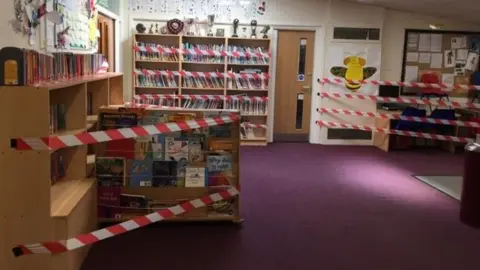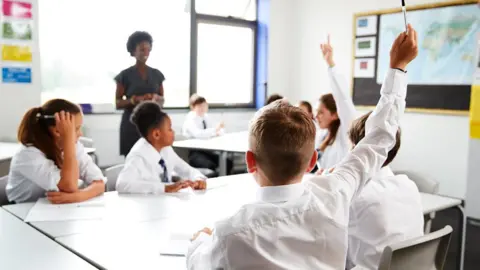Teachers' unions 'unconvinced' safe to open schools
 BBC
BBCTeachers' union leaders remain unconvinced that it will be safe to reopen schools in England on 1 June - after the publication of evidence from the government's scientific advisers.
Paul Whiteman of the NAHT head teachers' union says there is still no proof it would be a "wise thing to do".
Some councils also reject plans for a phased return for primary pupils.
The Department for Education has said returning to school is particularly important for disadvantaged children.
It is aiming for children in Reception, Year 1 and Year 6 to be invited back into primary schools after half term - and Education Secretary Gavin Williamson says the scientific evidence supports this "phased, cautious return".
Teachers' leaders had challenged ministers to publish the advice showing it would be safe for children and staff to go back to school.
And the unions' responses suggest the stand-off will continue - with warnings that the evidence released by the SAGE scientific advisory group is "inconclusive" and reveals gaps in scientific knowledge.
'Evidence gaps'
"It will quickly become clear to anybody reading the papers that the science is not definitive," said Geoff Barton, leader of the ASCL heads teachers' union.
"The papers highlight the significant gaps in evidence, knowledge and understanding," said Patrick Roach, leader of the Nasuwt teachers' union.
Rosie Kendrick, a mother of two children in Ealing, west London, believes the decision on going back to school should be left to the judgement of parents.
"I think we need to be respectful of each others' decisions when regarding the health and safety of their families," she said.
"There are people who need their children to go back to school - for work or mental health issues, free school meals or whatever."
But for other parents, she says the return to school might be too "anxiety inducing" and it might be better for them to keep their children at home.
Mary Bousted, co-leader of the National Education Union, said there was still only "weak evidence" on safety.
"We are surprised that the wider opening of schools proposed by Boris Johnson has not been modelled by SAGE.
"This points to a cavalier attitude towards the nation's children," said Dr Bousted.
 Getty Images
Getty ImagesInstead, seven other scenarios were modelled, with the DfE's preferred option being a combination of two options.
In its evidence, the scientific advisory group said the role of children in the transmission of Covid-19 was uncertain - and it "cannot be clear" the extent to which schools could be reopened without increasing the virus.
It said the risk to pupils of going back to school was "very, very small, but it is not zero".
Speaking at the Downing Street briefing, Sir Patrick Vallance, chief scientific adviser, would not be drawn on the decision on when schools should be reopened, saying that was for the government.
But he said: "The lower we get the number of new infections each week, the greater the chance of being able to do things.
"The more effective systems like test, trace and contain are, the more room you have to make other changes - the more we can modify environments to be useful to keep appropriate social distancing."
'Can't take that risk,' says dad
In Leeds, Daniel Smith, father of three, was not persuaded about the return of his six year old son.
"I understand where they're coming from but I generally can't take that risk, I don't want it spreading further than it has to be spread so it's safer for my own child and other children if I keep him off."
Bonnie Baker, another parent at Parklands primary school in Leeds, said: "Year 10s I think need to go back but I think the primary school are too young to get them not to interact."
The school's head teacher, Chris Dyson, said he was keen to return, but many parents seem reluctant.
"In Year 6, out of 46 parents we had nine who were willing to send their children back into school. In Year 1, we only had one out of 60 parents who were willing to send their children in and in Reception we had nobody."
The evidence published by the SAGE committee suggested that children were less likely to be severely ill from coronavirus, but there was less clear-cut evidence on how likely they were to be infected or spread the virus.
In scenarios for opening schools, the committee found opening nurseries and reception classes would be less likely to increase the spread of the virus than primary schools - but opening secondary schools could have a bigger impact than both.
The advice says strategies such as pupils coming in on alternate weeks could be "good ways to stop extensive transmission chains in school".
However, the advice also notes there is "limited evidence" on the impact of school closures on the rate of Covid-19 infections.
This is because the steps were taken at the same time as other lockdown measures - and it is "difficult to disentangle the individual impacts".
Since Boris Johnson announced the intention to reopen schools on 1 June, if conditions were right, teachers have challenged whether it would be safe.
Dozens of councils are also expected to delay opening schools until after that date.
Phased return
Education Secretary Gavin Williamson said: "The papers published by SAGE today show that the phased, cautious return of a limited number of pupils to classrooms has been a carefully considered decision based on the best scientific and medical advice."
"The welfare of children remains at the very heart of everything we are doing because being able to be back in school will benefit not just their education but also their wellbeing."
The Department for Education has also highlighted that schools could open from 1 June, but it was not a specific deadline.
On Thursday the governments of Scotland and Northern Ireland announced plans for a phased return to school for pupils, starting in August.
School in Wales will not go back on 1 June, but a date has not yet been sent.

- LOOK-UP TOOL: How exposed is your job?
- EXERCISE: What are the guidelines on getting out?
- THE R NUMBER: What it means and why it matters
- UK SPREAD: How many cases in your area?

